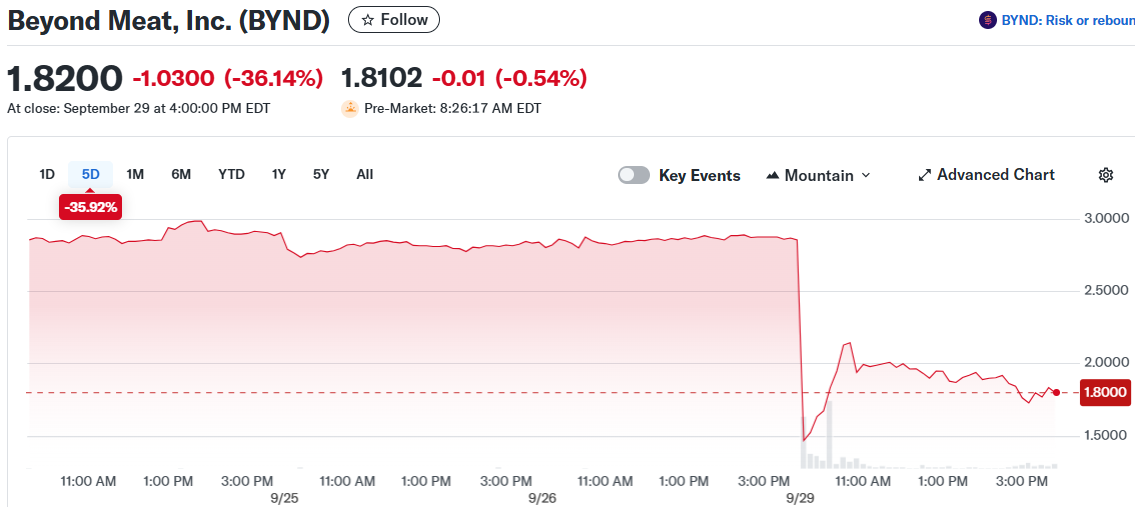TLDR
- Beyond Meat stock plummeted to a record low of $1.23 on Monday, marking a 32% single-day decline and 50% drop year-to-date.
- The company is offering to exchange $1.15 billion in 0% convertible notes due 2027 for new 7% notes due 2030 plus 326 million shares.
- The debt restructuring requires 85% creditor approval by October 28, with 47% of holders already agreeing to the terms.
- Beyond Meat reported its lowest quarterly revenue of $69 million in Q1 2025 and has laid off employees while suspending China operations.
- Six of nine analysts rate the stock as sell or strong sell due to weak demand and financial instability.
Beyond Meat stock crashed to its lowest price ever on Monday. Shares fell to $1.23 during trading, closing down 32.1% at $1.93.

The collapse followed news of a major debt restructuring. The plant-based food maker announced an exchange offer aimed at eliminating over $800 million in debt.
The stock has struggled throughout 2025. Shares are down roughly 50% year-to-date and have lost 82% of their value over the past 12 months.
Beyond Meat currently holds $1.15 billion in convertible notes that mature in 2027. These bonds carry a 0% interest rate.
Under the new proposal, creditors would receive up to $202.5 million in new convertible notes. These notes pay 7% interest and mature in 2030.
Holders would also get 326 million shares of common stock. The influx of new shares has concerned investors.
Payment-in-Kind Structure Extends Timeline
The new notes use a payment-in-kind structure. This allows Beyond Meat to pay 9.5% annual interest with additional debt instead of cash.
CEO Ethan Brown said the exchange offer would reduce leverage and extend maturity. He described these changes as crucial for the company’s vision as a global plant protein leader.
About 47% of note holders have already accepted the deal. That represents approximately $203 million in new bonds.
Other creditors face an October 28 deadline to decide. Those who accept before October 10 receive a premium payment.
The deal requires 85% creditor approval to proceed. Meeting this threshold remains uncertain.
Financial Struggles Mount
Beyond Meat posted its lowest quarterly revenue ever in Q1 2025. The company brought in just $69 million during the period.
Last month, management reported another revenue decline and a wider-than-expected loss. The company blamed weak US consumer demand.
Management said it faces “an elevated level of uncertainty.” Beyond Meat declined to provide full-year financial guidance.
Plant-based meat sales in the US fell 7% last year. Pricing concerns and ultra-processing worries have driven consumers away.
The company laid off 9% of its global workforce in February. All China-based employees lost their jobs as operations were suspended.
Another 44 North American employees were let go in August. The cuts reflect efforts to preserve cash.
Beyond Meat secured $100 million in debt financing from Unprocessed Foods earlier this year. The lender is part of the Ahimsa Foundation, a plant-based diet advocacy group.
The company hired John Boken as interim chief transformation officer. He’s a managing director at restructuring firm AlixPartners.
Management aims to achieve EBITDA-positive status by the second half of 2026.
Wall Street Remains Bearish
TD Cowen analysts acknowledged management recognizes the “existential threat” facing the business. They noted steps to preserve cash and stabilize sales.
However, the firm maintains a sell rating. Analysts cited the company’s fragile financial condition and weak alternative meat demand.
Of nine analysts covering Beyond Meat, only three rate it a hold. Six recommend selling the stock, according to LSEG data.
Beyond Meat is rebranding by dropping “Meat” from its name. The shift focuses on traditional plant proteins.
The next product, Beyond Ground, contains four ingredients: fava bean protein, potato protein, water and psyllium husk. It doesn’t attempt to replicate meat.
Creditors have until October 28 to accept the exchange offer, which needs 85% approval to eliminate more than $800 million in debt.





